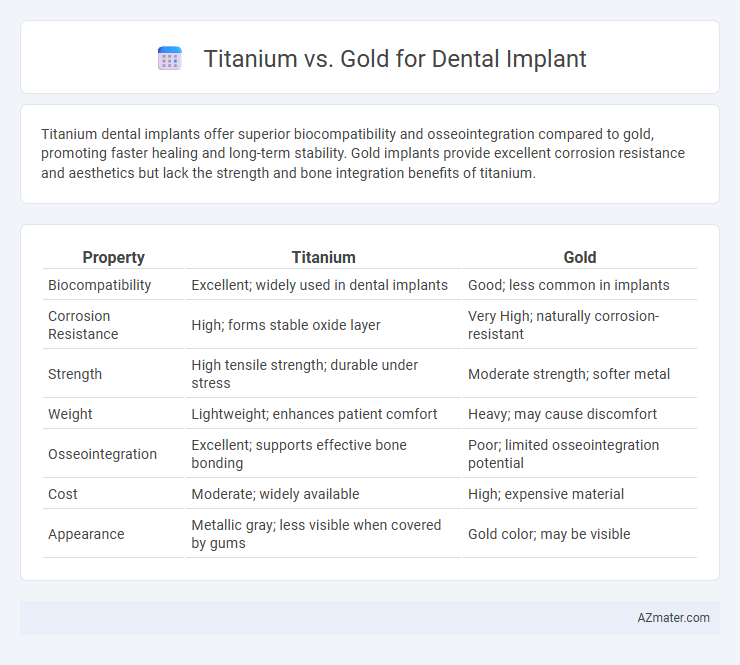Titanium dental implants offer superior biocompatibility and osseointegration compared to gold, promoting faster healing and long-term stability. Gold implants provide excellent corrosion resistance and aesthetics but lack the strength and bone integration benefits of titanium.
Table of Comparison
| Property | Titanium | Gold |
|---|---|---|
| Biocompatibility | Excellent; widely used in dental implants | Good; less common in implants |
| Corrosion Resistance | High; forms stable oxide layer | Very High; naturally corrosion-resistant |
| Strength | High tensile strength; durable under stress | Moderate strength; softer metal |
| Weight | Lightweight; enhances patient comfort | Heavy; may cause discomfort |
| Osseointegration | Excellent; supports effective bone bonding | Poor; limited osseointegration potential |
| Cost | Moderate; widely available | High; expensive material |
| Appearance | Metallic gray; less visible when covered by gums | Gold color; may be visible |
Introduction: Titanium vs Gold in Dental Implants
Titanium and gold are two primary materials used for dental implants, each offering unique benefits and durability. Titanium is renowned for its exceptional biocompatibility, strength, and osseointegration capabilities, making it the most widely preferred material in modern implantology. Gold, though less common, provides excellent corrosion resistance and malleability, suitable for patients with metal sensitivities or specific aesthetic requirements.
Material Properties of Titanium and Gold
Titanium exhibits exceptional biocompatibility and osseointegration due to its corrosion resistance and ability to form a stable titanium oxide layer, making it the preferred material for dental implants. Gold, while highly malleable and corrosion-resistant, lacks the mechanical strength and rigidity of titanium, which can lead to implant failure under masticatory forces. The superior mechanical properties of titanium, including its high strength-to-weight ratio and fatigue resistance, ensure long-term durability and stability in dental applications.
Strength and Durability Comparison
Titanium dental implants exhibit exceptional strength and biocompatibility, making them the preferred choice for high-load bearing applications due to their ability to withstand significant chewing forces without deformation. Gold implants offer good resistance to corrosion and excellent biocompatibility but generally have lower tensile strength and are softer, which can lead to increased wear over time compared to titanium. The superior durability and osseointegration properties of titanium contribute to its longer lifespan and consistent performance in dental restorations.
Biocompatibility and Tissue Integration
Titanium dental implants exhibit exceptional biocompatibility due to their ability to form a stable oxide layer, promoting strong osseointegration and minimizing immune response. Gold, while biocompatible and corrosion-resistant, shows less favorable tissue integration and higher costs, limiting its use compared to titanium. Studies confirm titanium's superior performance in supporting healthy peri-implant soft tissue and long-term implant stability.
Aesthetic Considerations in Dental Implants
Titanium dental implants offer superior strength and biocompatibility but may occasionally cause a grayish hue to appear near the gum line, impacting aesthetic outcomes in patients with thin or receding gums. Gold implants provide a warmer color that can blend more naturally with surrounding teeth and soft tissue, enhancing the visual appeal in smile zones where aesthetics are critical. Careful evaluation of gum thickness and color, along with material selection, is essential to optimize aesthetic results in dental implant procedures.
Cost Differences: Titanium vs Gold
Titanium dental implants typically cost between $3,000 and $4,500 per implant, offering a cost-effective and durable solution widely used in modern dentistry. Gold implants, while less common, can range from $4,500 to $7,000 or more due to the material's higher price and specialized manufacturing processes. The price disparity is largely influenced by gold's material cost and biocompatibility benefits, but titanium remains the preferred choice for balancing affordability and strength.
Corrosion Resistance and Longevity
Titanium exhibits superior corrosion resistance in dental implants due to its stable oxide layer that prevents degradation in the oral environment, ensuring long-term durability. Gold, while biocompatible, is more susceptible to corrosion over time when exposed to saliva and acidic conditions, potentially compromising implant stability. The enhanced corrosion resistance of titanium directly contributes to its longer lifespan, making it the preferred choice for dental implant longevity.
Allergic Reactions and Patient Safety
Titanium dental implants exhibit minimal allergic reactions due to their high biocompatibility and corrosion resistance, making them the preferred choice for patient safety in most cases. Gold implants, while historically used, have a higher risk of causing hypersensitivity and allergic responses because of metal ion release over time. Clinical studies indicate that titanium's inert properties significantly reduce inflammation and implant failure rates, enhancing long-term patient outcomes.
Clinical Outcomes and Success Rates
Titanium dental implants demonstrate high clinical success rates exceeding 95% due to excellent osseointegration and biocompatibility. Gold implants, while historically valued for corrosion resistance and malleability, show lower widespread clinical adoption and limited long-term outcome data. Titanium's strength-to-weight ratio and proven ability to support bone regeneration contribute to its status as the preferred material for durable and effective dental implant procedures.
Choosing the Right Material for Dental Implants
Titanium dental implants are highly favored for their exceptional biocompatibility and durability, promoting osseointegration with minimal risk of rejection or allergic reactions. Gold implants offer excellent corrosion resistance and biocompatibility but are less commonly used due to higher costs and lower mechanical strength compared to titanium. Choosing the right material depends on factors such as patient allergies, budget constraints, aesthetic preferences, and long-term performance requirements.

Infographic: Titanium vs Gold for Dental Implant
 azmater.com
azmater.com